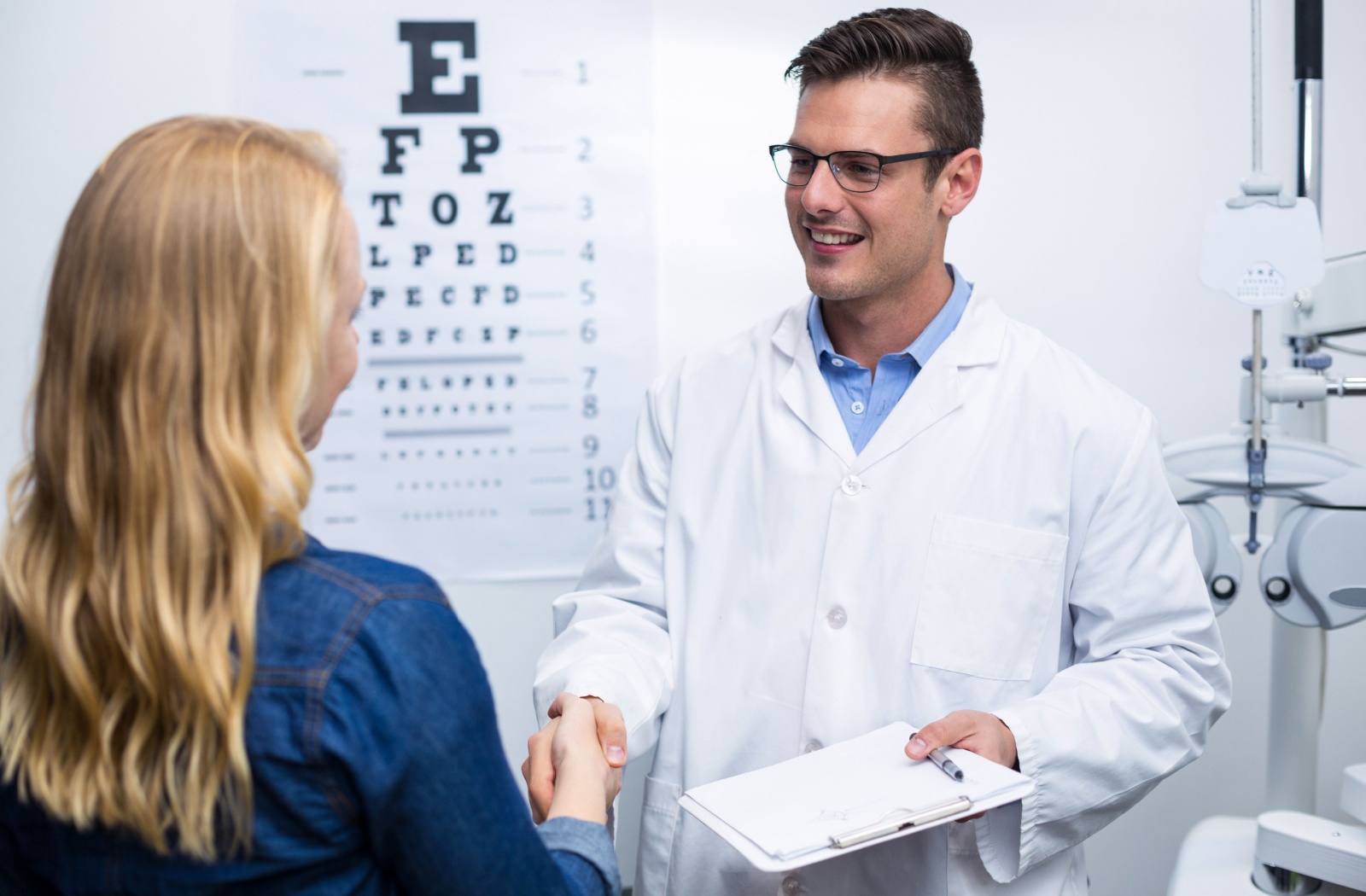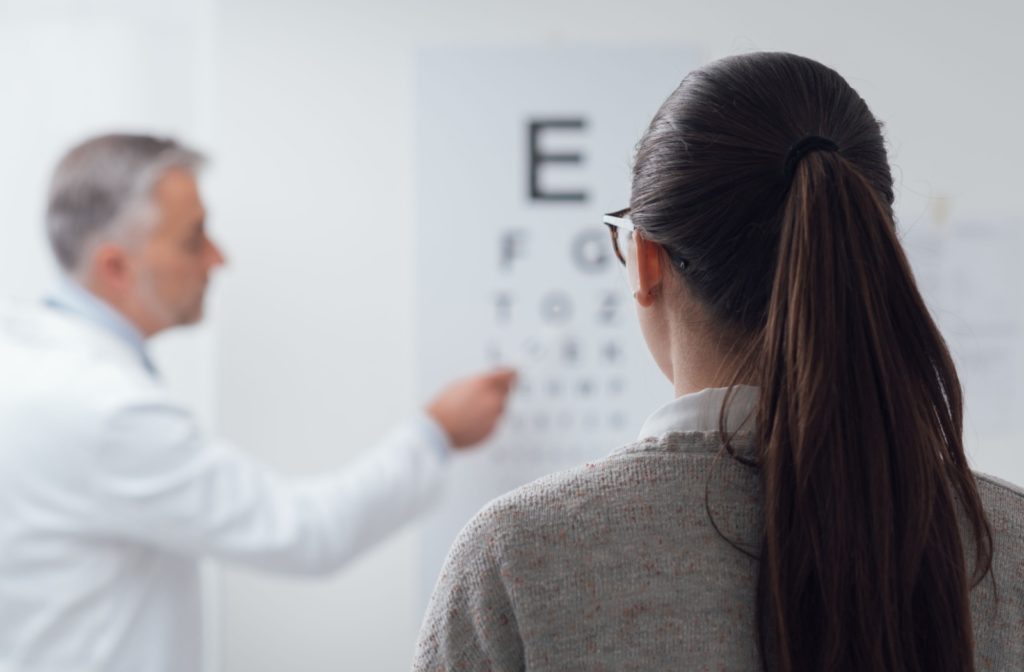Taking the time for regular checkups is a crucial part of maintaining your health. But when it comes to eye exams, many people are unsure what their family can expect and how long they should set aside for this important appointment.
While the length of an eye exam depends on the types of tests you require, it typically takes 30–60 minutes.
This time is well spent. An eye exam is not just about getting a new glasses prescription; it’s an integral part of preventive healthcare, allowing eye care professionals to spot potential issues early on. Investing time in your family’s eye health can be a life-saver—quite literally!
What Happens at an Eye Exam?
Eye exams are thorough processes that are much more than reading the smallest line on the eye chart. It’s an opportunity to gain insight into your eye health, so your eye doctor will try to make the most of it. The tests are straightforward and tailored to your age and symptoms.
Preliminary Testing
The initial part of an eye exam often involves a series of tests designed to assess your vision acuity, depth perception, colour vision, and peripheral vision. These tests give us a baseline understanding of your overall eye health.
If this is your first time, we’ll also go over your medical history, so we know what we should be looking out for!
Refraction Test
Refraction tests help us determine your eyeglasses prescription. You’ll be asked to look through a phoropter—that big mask-like machine with so many lenses. Don’t fret, it’s less complicated than it looks! All you have to do is look at a chart and let us know which lens option gives you the clearest vision.
Your optometrist also may perform a computerized test, using a machine that shines a light into your eye and measures the amount that bounces off the back.
Ocular Health Evaluation
We can use different instruments and methods to evaluate the health of your eyes, including looking for signs of glaucoma, cataracts, and retinal issues. A slit lamp allows us to check out your eyes up close. Pupil dilation may also be necessary, which involves using eye drops to widen the pupil, giving us a better view of your eye’s internal structures.
Tonometry
Tonometry measures the pressure inside your eye. High intraocular pressure can be an indication of glaucoma, a group of eye conditions that can cause blindness if left untreated.
Summary & Discussion
Following the exam, we can discuss the results with you. Not only is this our time to offer diagnosis and recommendations, but it’s also your time to ask questions about your eye health.
What Can an Eye Exam Diagnose?
An eye exam is a diagnostic powerhouse, capable of identifying several types of conditions, including:
- Refractive errors
- Cataracts
- Glaucoma
- Age-related macular degeneration (AMD)
- Diabetic retinopathy
Believe it or not, an eye exam opens a window to more than just eye health. It can take a peek into the wellness of your entire body. Other health issues that can potentially be detected during a comprehensive eye exam include:
- Diabetes
- High blood pressure
- High cholesterol
- Thyroid disease
- Autoimmune disorders
- Tumours
- Risk of stroke
The Length of an Eye Exam
The time it takes to complete your eye exam can vary depending on several factors, such as:
- The thoroughness of the exam
- The presence of pre-existing conditions
- The need for further testing or consultation
- The speed of your specific eye doctor
Generally speaking, an eye exam averages 30 minutes to an hour, but can be longer for more complicated cases.
What Affects the Length of an Exam?
- A typical appointment may range from 20 minutes to 40 minutes for adults without the need for additional testing.
- Children’s eye exams are typically shorter. We schedule our children’s eye exams to be between 15 and 30 minutes.
- Patients with pre-existing conditions or those who need additional testing should allocate around an hour or more for their appointment.
- The need for dilation can also extend the examination time, and you’ll need to prepare a way to get home as you’ll likely be unable to drive yourself.
Preparing for Your Appointment
To make the most of your eye exam, it’s important to prepare:
- Medical history: Be ready to provide a comprehensive medical history, including any past eye problems and a list of medications you are currently taking.
- Family eye history: It’s important to share any eye conditions that run in the family.
- List of concerns: If you’ve noticed any changes in your vision or have particular concerns, jot them down before the appointment so you don’t forget to bring them up.
- Lifestyle choices: Tell your eye care provider about any changes in your day-to-day activities that might impact your vision, such as increased screen time or a new hobby.

Book Your Eye Exam Today
An eye exam is much more than the sum of its tests. It’s a vital health experience that can make a positive difference in many aspects of your family’s life.
Adults 19–64 should have a comprehensive exam every 2 years at least. Anyone younger and older than that should plan for annual trips, as your eyes may rapidly change. This is the same for people at risk of vision problems.
Even in the rush of daily living, we hope it’s comforting to know that a little time devoted to an eye exam can safeguard the very things that you rely on day in and day out—your ability to see the world around you a little clearer. Book your eye exam with Village Optical today. Remember, your eyes are worth every second of it!



